|
|
|
Sort Order |
|
|
|
Items / Page
|
|
|
|
|
|
|
| Srl | Item |
| 1 |
ID:
116576
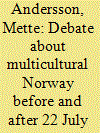

|
|
|
| 2 |
ID:
116581
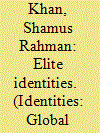

|
|
|
|
|
| Publication |
2012.
|
| Summary/Abstract |
Elites have changed. They are now more open and meritocratic. They are also the engines of inequality. In this article, I argue that elites have embraced the rhetoric of the rights movements of the past decades, becoming champions of the notion that it is individual capacities that matter, not ascriptive characteristics. This stance embraces a new efficiency of our world, that of the market. The earnest deployment of these ideas by the elite has resulted in a world with less equality, less mobility and a more empowered elite. I reflect on how this came to be, and how such elite identities might be challenged in the service of the public welfare.
|
|
|
|
|
|
|
|
|
|
|
|
|
|
|
|
| 3 |
ID:
116587


|
|
|
|
|
| Publication |
2012.
|
| Summary/Abstract |
The focal point of this article is identity as potentiality: how a narrated form of self-understanding can be mobilised, enacted and shared with others within unequally distributed multifaceted conditions of existence, with other outcomes than surrender to disowned and self-confirming actions of reproduced exclusion, subordination and enclosure. Concretely, this distribution demonstrates how and why identity as potentiality might come into being within the play of forces in the life of a young Muslim woman trying to incorporate herself into Swedish multicultural society. In addition, the reader will meet reflections on respectability, multicultural incorporation and the possibility of a non-injurious criticism.
|
|
|
|
|
|
|
|
|
|
|
|
|
|
|
|
| 4 |
ID:
116577


|
|
|
|
|
| Publication |
2012.
|
| Summary/Abstract |
Recent changes to immigration and registration laws represent a profound shift in official imaginings of the relationship between Japanese and non-Japanese residents point to the possibility of real change occuring in the way that with those with different nationalities/ethnicities live together in the same physical and cultural space here in Japan. In this paper, I focus on and offer an interpretation of these changes in the light of hitherto less inclusive positioning of ethnic minorities. I will consider their likely impact on the identities of both minorities and the majority Yamato Japanese. I will argue that in the context of a shift away from the dominant post-war discourse of homogeneous nation to multicultural coexistence society, a space is opening up for greater acceptance of, and thus freedom to express, difference in Japan. Yet there are also moves towards an ever harsher position on undocumented migrants and greater centralised control of all foreign residents.
|
|
|
|
|
|
|
|
|
|
|
|
|
|
|
|
| 5 |
ID:
116580


|
|
|
|
|
| Publication |
2012.
|
| Summary/Abstract |
This article explores the place of race, class, gender, sexual and national identities and cultures in global climate change. Research on gendered vulnerabilities to disasters suggests that women are more vulnerable than men to many meteorological disasters related to climate change, specifically flooding and drought. This is because of their relative poverty, economic activities (especially subsistence agriculture) and the moral economies governing women's modesty in many cultures. Research on historical and contemporary links between masculinity and the military in environmental politics, polar research and large-scale strategies for managing risk, including from climate change, suggests that men and their perspectives have more influence over climate change policies because of their historical domination of science and government. I expect that masculinist identities, cultures and militarised institutions will tend to favour large-scale remedies, such as geoengineering, minimise mitigation strategies, such as reducing energy use, and emphasise 'security' problems of global climate change.
|
|
|
|
|
|
|
|
|
|
|
|
|
|
|
|
| 6 |
ID:
116573
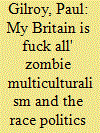

|
|
|
|
|
| Publication |
2012.
|
| Summary/Abstract |
This paper uses the 2011 viral video "My Tram Experience" as a prism through which to consider aspects of the contemporary politics of race and racism, immigration and misoxeny in Britain. The release and popularity of that clip is seen in the context of the second trial of the murders of Stephen Lawrence and in relation to technological changes and the emergence of virtual and immaterial racism on social media sites like Twitter and Facebook.
|
|
|
|
|
|
|
|
|
|
|
|
|
|
|
|
| 7 |
ID:
116585


|
|
|
|
|
| Publication |
2012.
|
| Summary/Abstract |
The city remains a crucial arena in condensing the challenges we face in migration and transnational research. Our understanding of cities and their connections with migration and ethnicity lies at the centre of these challenges and raises two problems demanding urgent attention. These relationships are under-theorised and poorly demonstrated. Secondly, older, more settled notions of the relationship between ethnicity, migration and space persist, supporting new nationalisms. This paper suggests that we think about ethnicity and migration cartographically as translocal journeys around and between cities.
|
|
|
|
|
|
|
|
|
|
|
|
|
|
|
|
| 8 |
ID:
116578
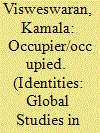

|
|
|
|
|
| Publication |
2012.
|
| Summary/Abstract |
As military occupation increasingly informs the politics of both democracies and dictatorships, capitalist and socialist regimes, this essay asks why it is foundational for sovereignty and the post-war state-form. In particular, it questions the complicity of post-colonial theory with security discourses in reading movements for self-determination as threats to the state or as forms of terrorism rather than as alternate possibilities for freedom and liberty. It suggests not only that the ongoing twenty-first century relations between occupier and occupied reprise the racialised forms of identity that characterised relations between coloniser and colonised in the preceding two centuries, but also that relations between occupied peoples may produce affiliative poetics and shared terms of political reference or solidarity.
|
|
|
|
|
|
|
|
|
|
|
|
|
|
|
|
| 9 |
ID:
116584
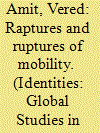

|
|
|
|
|
| Publication |
2012.
|
| Summary/Abstract |
This article examines the ways in which the trope of rupture has progressively figured in my studies of diverse forms of mobility. Ironically, this has occurred at the same time as an increasing orientation within migration studies towards transnational links has given a strong emphasis on continuity. I argue that this kind of methodological transnationalism does not give enough attention either to the disjunctures that are routinely involved in mobility or to the possibility that rupture might be an actively desired goal for moving either temporarily or for the longer term.
|
|
|
|
|
|
|
|
|
|
|
|
|
|
|
|
| 10 |
ID:
116574
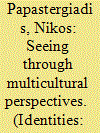

|
|
|
|
|
| Publication |
2012.
|
| Summary/Abstract |
The narrative that links the migrant rights movements with the formation of multiculturalism is now well known. There is still much to debate on the centrality of social justice in multicultural discourse and the dynamic versus static view of cultural representation. In this article, I aim to revisit some of the reflections by founding figures in Australian multiculturalism with the purpose of examining the cultural horizons that framed their motivation and aspiration. It is my contention that among many of these figures, there was not only a desire to see a more just society in which the welfare service, political rights and economic opportunities for migrants were developed in a more responsive manner, or what we may call activist multiculturalism, but there was also an implicit world view that was not only focused on securing more rights for minorities and gaining support of marginalised ethno-specific communities, but also committed to a wider sense of diversity. This article will explore the aesthetic dimensions that relate to the rather vague and often abstract sentiments that were expressed towards cultural diversity, but were also expressive of different multicultural perspectives.
|
|
|
|
|
|
|
|
|
|
|
|
|
|
|
|
| 11 |
ID:
116586
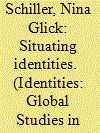

|
|
|
|
|
| Publication |
2012.
|
| Summary/Abstract |
This article queries the pervasiveness of binary thinking in contemporary identity studies. Reviewing the genealogy of binary alterity beginning with the synergies between the European Enlightenment and colonialism, I note the binary logics that remained embedded within the apparently disparate schools of structuralist and poststructuralist theory. Even the social constructionism of post-colonial scholarship became transmuted through a celebration of radical relativism into a legitimation of continued racialised or culturalised inequalities. To counter this position, I build on but also critique efforts to theorisations of relationalities. A reconstituted identity studies requires the theorisation of unequal globe-spanning imperial power and its contestations through domains of mutual practice. If we set aside an assumption of binaries of difference, such domains of relationship can be found as people meet in terms of their commonalities of experience and aspirations for equality, justice and respect.
|
|
|
|
|
|
|
|
|
|
|
|
|
|
|
|
| 12 |
ID:
116588


|
|
|
|
|
| Publication |
2012.
|
| Summary/Abstract |
The structure of afterthought - which I take from the French phrase 'l'esprit de l'escalier' - has an unhealthy domination over our thought, our scholarship and politics. Rather than facing up to the present and writing to the future, there is a powerful tendency to retain our gaze backwards, to be shackled in the past way of thinking. I suggest the counter-structure of imagination as one way to think about the nature of scholarship.
|
|
|
|
|
|
|
|
|
|
|
|
|
|
|
|
| 13 |
ID:
116575
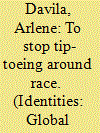

|
|
|
|
|
| Publication |
2012.
|
| Summary/Abstract |
A look at what recent debates over Mexican-American and ethnic studies in Arizona reveals about racial dynamics in the American academy and beyond. Author argues that academics have much to learn from activists challenging the current ban on ethnic studies.
|
|
|
|
|
|
|
|
|
|
|
|
|
|
|
|
| 14 |
ID:
116579
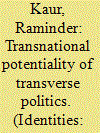

|
|
|
|
|
| Publication |
2012.
|
| Summary/Abstract |
How can we conceive of global studies of culture and power without (i) overlooking the parameters of the nation state as a forceful axis of power, (ii) prioritising the West as the fount of energised political directives and (iii) reinforcing neo-liberal assumptions on culture and subjectivities? With a reappraisal of theories of globalisation, I elaborate on a transverse politics for transnational studies. I suggest that the national need be foregrounded in any appraisal of the power-laden axes in the co-constitution of the local and the global. Too often, the 'national' is all too easily contracted into the 'local'. I also revisit earlier works to propose multi-sited, engaged and transversal studies that do not simply follow and track global flows but question and undermine their hegemonic trails.
|
|
|
|
|
|
|
|
|
|
|
|
|
|
|
|
| 15 |
ID:
116582
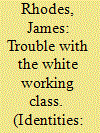

|
|
|
|
|
| Publication |
2012.
|
| Summary/Abstract |
Over the course of the last two decades, 'whiteness' has exploded as an area of academic inquiry bringing together scholars from an array of academic disciplines and generating significant new insights that have contributed to a more complex understanding of a racialised positioning often taken for granted as a normative, unmarked, even invisible system of privilege. Within this field, the 'white working class' has come to assume an integral position. This category has offered an analytic object through which notions of enduring white privilege, white victimhood, multicultural politics and white racism have all been explored. While there are clear and striking political problems within all of these dominant accounts, this article instead focuses on a more foundational and related issue: that of the invocation of the 'white working class' itself.
|
|
|
|
|
|
|
|
|
|
|
|
|
|
|
|
| 16 |
ID:
116583


|
|
|
|
|
| Publication |
2012.
|
| Summary/Abstract |
Several problems plague migration scholarship. Much work continues to use specific national (and sometimes regional) frames to analyse migration in other contexts or to find general properties based on particular national experiences. It assumes that boundedness, rootedness and membership in a single national, ethnic or religious group are the natural order of things. And it doesn't take culture seriously enough, whether it be the different cultures of knowledge production which drive our work, the different culturally infused categories we use or the role of cultural institutions in imagining and changing the nation. This article expands on these critiques and suggests ways to move scholarship forward.
|
|
|
|
|
|
|
|
|
|
|
|
|
|
|
|
|
|
|
|
|